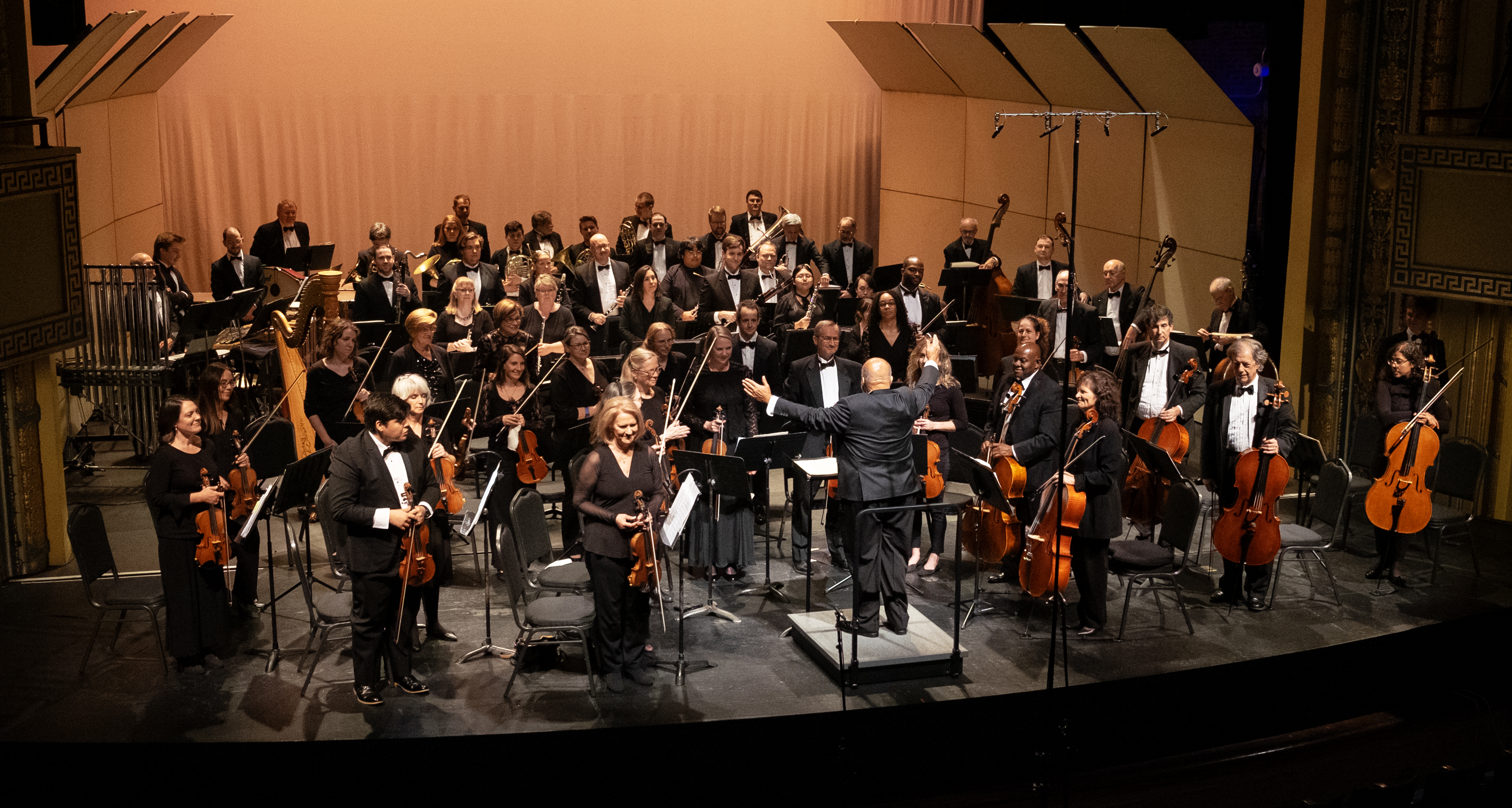A typical classical music concert may bring to mind centuries-old music and European composers in powdered wigs. Now approaching its 50th year, the Durham Symphony Orchestra is anything but typical, offering a far more eclectic musical buffet. A performance may include those familiar classics; it surely will feature music that better reflects America – everything from classical, baroque and chamber music to rock, jazz and rap. One thing is certain: you will learn something from DSO’s artistic director, Maestro William Henry Curry, who provides histories, contexts and backstories at each concert.
Creating a script is serious business for Curry, whose role model is the legendary American composer and conductor Leonard Bernstein. Once panned by critics for his accessible style, Bernstein believed, “All music is great as long as it’s great.” Curry elaborates: “He didn’t talk down to his audiences; they were his equals. He knew more about Beethoven and was excited to share.” Curry shares this deep reverence and passion for the artform. “I’m a minister of music. It is the most glorious thing in the world and it’s my honor to spread the love. It should be fun!” To this end, Curry brings a broad repertoire to the stage while drilling down on fascinating facts about the people behind the music. He calls it “education and entertainment.”
One way DSO contests the status quo is its “Concert of Canceled Music.” This wide-ranging showcase of pieces which, for reasons past or present, had been forbidden, is a kind of musical commentary about cancel culture, censorship and the recent spate of book bans. It included works by American composers under FBI scrutiny during McCarthyism, as well as a tribute to the contralto Marian Anderson, who delivered her most famous concert on the steps of the Lincoln Memorial after Constitution Hall refused to allow her to perform. Another was a cantata Josef Stalin’s regime forced Sergei Prokofiev to compose for the dictator’s 60th birthday. Given modern reconsiderations of history, the cantata is rarely heard today. DSO recontextualized it, and Curry rewrote the piece to celebrate the rhapsodic orchestral composition rather than the problematic lyrics.
The first Black maestro of any major Southern symphony, Curry recalls rejections from other orchestras who told him they preferred “conductors with European accents” and worried “a Black conductor may hurt our fundraising.” Conversely, under Curry’s leadership, DSO is building a bigger table – or stage, as it were – by removing the barriers that discourage musical aspirations. DSO works with young musicians at local colleges and high schools and offers a conducting fellowship so early-career maestros can gain experience wielding the baton for live musicians before an audience.
Ever mindful of the power of art to transform and unite, DSO is unafraid to push its audiences in ways that deftly elevate the entire community. Its Valentine’s Day concert featured a composition written by one of Curry’s young mentees – a musical prodigy who died in a police encounter. Before staging the performance, “Voices of the Unarmed: Justice, Love, Resilience,” DSO convened and listened to both law enforcement groups and restorative justice groups.
Late composer Herman Whitfield III’s parents were in attendance for the performance. The symphony expected hecklers. They received five standing ovations.
During the pandemic, DSO reached audiences by posting videos online and sharing them with subscribers via email. One could be forgiven for assuming an orchestra this bold and creative has a massive team behind it, but it has very few paid staff. “Our musicians are part of the community – doctors, lawyers, teachers,” said Violinist and Board President Suzanne Bolt. “Even our principals have day jobs.”
As it approaches its golden anniversary, the orchestra hopes to broaden the stage even more by spotlighting LGBTQ composers. To bring those voices to the stage, it is engaging with the Pauli Murray Center, which celebrates the human rights activist, legal scholar, feminist, writer, Episcopal priest, and multiracial gender nonconforming Durham native.
The organization’s innovation, creativity, and deep community engagement are reasons why the Mary Duke Biddle Foundation proudly partners with and supports the Durham Symphony Orchestra. DSO falls under MDBF’s new grantmaking approach, which aims to be more accessible, reduce red tape and help organizations be more effective and innovative. MDBF hopes to foster creativity, innovation and learning in the Triangle with meaningful collaboration and reliable, flexible general operating resources. Its goals include helping nonprofit arts education organizations like DSO build momentum, stay curious and creative, and shape Triangle communities into being the best places to live, work, learn and play.
What better place to learn and play than a fun-loving and educational symphony hall with the love and courage to elevate its community through music?
“We have to find courage,” said Curry. “We know we are in a serious era. People are looking for a safe space with other intellectuals to share not fluff, but something that’s honest, credible and substantial. Music is more than music.”
Bolt agrees: “Grief and loss are universal human experiences. Music and art can heal.”
Check out DSO’s season schedule and videos of past performances on its website. Plan a date with the Maestro as the orchestra proudly and bravely ushers in its golden anniversary. Come as you are, with an open, curious mind. No powdered wigs necessary.

